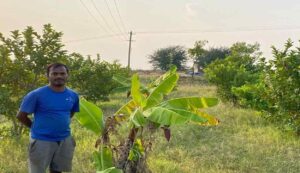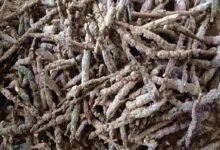Success Story: Know the story of Vikram Singh Bayali’s journey from being an IT professional to a proponent of regenerative farming
Success Story: Visionary farmer Vikramsingh Byali, 40, of Gadag, Karnataka, switched to agriculture after a prosperous 14-year career in the IT sector, which included a 10-year stay in the US. Vikram quit his IT career in 2021 to start a life-changing adventure in the agriculture industry because he was passionate about sustainable and regenerative farming and felt a strong connection to his origins.

Making the Switch to Farming
In 2022, he used his funds from his stay in the US to buy 9 acres and 6 guntas of farmland. In an effort to improve the environment, he embraced the ideas of permaculture and regenerative agriculture. By using regenerative organic agricultural methods, we can lessen the effects of climate change and even reverse them. In order to guarantee healthy soil for future generations, he is now attempting to restore soil health, preserve water, and encourage ecologically friendly agricultural methods.
Using Sustainable and Organic Farming Methods
On his farm, Vikram uses sustainable and organic procedures. In order to cultivate crops like guava, seasonal vegetables, pulses (Bengal gram, green gram, urad, moong, and horse gram), onions, and chilies, he embraced multi-cropping and organic agricultural practices. Vikram only employs organic pest management techniques on his farm, in contrast to typical farmers who mostly depend on artificial fertilizers and pesticides.
His farm is now in the process of becoming entirely organic; this process takes three to five years. To expedite the process, he employs the Dhaincha (green manure) crop. In addition, he has five Desi cows, including Gir and Mallargidha breeds, which he uses just for their urine and cow manure that he uses to make vermicomposts for organic pest management.
Eco-Friendly Methods of Controlling Pest Populations
To manage pests on his farm, Vikram employs a mix of natural materials. He makes efficient organic pest control treatments using sour buttermilk, neem oil, and cow urine. These techniques aid in controlling insect populations without endangering the land or the ecosystem. In contrast to the vulnerabilities associated with monocropping, his multicropping method includes a variety of crops that naturally aid in limiting the spread of pests.
Obstacles and Achievements
Since the beginning of everything brings difficulties, our trip and Vikram’s are identical. His farm is now undergoing an organic transition, which has resulted in decreased production in the first several years while the soil converts organically. Crop losses have also been caused by heavy rainfall during certain seasons. Despite these failures, he is still dedicated to sustainable farming because he knows that the long-term advantages exceed the short-term difficulties.
Budget and Prospects
Vikram makes between Rs 1.5 and Rs 2 lakh a year from farming, and as his organic practices gain traction, his income is expected to increase. By turning pulses into dals, which are supplied directly to customers across Karnataka, he also concentrates on value addition. He is able to avoid traditional marketplaces with this strategy, as organic food is not distinguished from conventional goods. In order to generate power in the field in a sustainable manner, he also intends to build a biogas unit on his farm using the cow excrement he collects from his cows.
Vikram wants to encourage and educate other farmers in his area to adopt regenerative and organic agricultural practices. In order to investigate government programs and subsidies that can aid farmers in making the switch to sustainable methods, he is actively collaborating with regional agricultural departments. By creating a network of organic customers in his area and across Karnataka, he is also assisting organic farmers in selling their goods.
In order to sell organic products and get fair prices for organic farmers, he is also actively collaborating with wholesalers and retailers in the Indian organic market. He also wants to establish a community of farmers that value soil and water conservation and are concerned about the environment.
The path of Vikramsingh Byali is proof of the effectiveness of sustainable agriculture. In addition to helping the environment, his commitment to regenerative agricultural techniques establishes a standard for coming generations.

